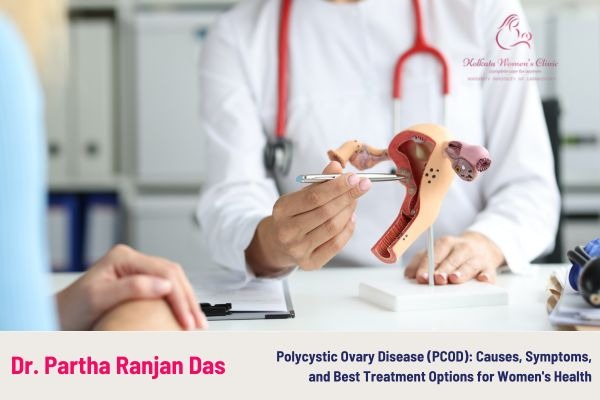Polycystic Ovary Disease (PCOD): Causes, Symptoms, and Best Treatment Options for Women's Health
Polycystic Ovary Disease (PCOD) is a common hormonal disorder that affects women of reproductive age, leading to irregular periods, weight gain, and fertility issues. Understanding its causes, symptoms, and treatment options is crucial for managing the condition effectively.
Dr. Partha Ranjan Das
2/19/20252 min read


Introduction
Polycystic Ovary Disease (PCOD) is a hormonal condition that affects ovarian function. Women with PCOD experience irregular ovulation, which can lead to multiple cysts in the ovaries, hormonal imbalances, and metabolic disturbances. If left untreated, PCOD can increase the risk of diabetes, heart disease, and infertility.
According to Dr. Partha Ranjan Das, early diagnosis and lifestyle modifications are key to managing PCOD effectively.
Causes of PCOD
The exact cause of PCOD is not fully understood, but it is believed to result from:
Hormonal Imbalances: Excess androgens disrupt ovulation and cause acne, excess hair growth, and weight gain.
Insulin Resistance: High insulin levels contribute to increased androgen production, worsening PCOD symptoms.
Genetics: Women with a family history of PCOD are at higher risk.
Lifestyle Factors: Poor diet, lack of exercise, and obesity can worsen the condition.
Common Symptoms of PCOD
Irregular or Absent Periods
Excessive Hair Growth (Hirsutism) on the face, chest, or back
Acne and Oily Skin
Weight Gain and Difficulty Losing Weight
Thinning Hair or Hair Loss
Dark Patches on the Skin (Acanthosis Nigricans)
Difficulty Conceiving (Infertility)
Diagnosis of PCOD
Dr. Partha Ranjan Das emphasizes the importance of a thorough diagnosis, which includes:
Medical History and Symptom Assessment
Pelvic Ultrasound to check for ovarian cysts
Blood Tests to assess hormone levels, blood sugar, and insulin resistance
Best Treatment Options for PCOD
1. Lifestyle Modifications
Healthy Diet: A balanced diet rich in fiber, lean protein, and healthy fats helps regulate hormones.
Regular Exercise: Physical activity improves insulin sensitivity and aids in weight management.
Stress Management: Yoga, meditation, and good sleep hygiene help balance hormones.
2. Medications for PCOD Management
Oral Contraceptives: Birth control pills regulate periods and lower androgen levels.
Metformin: Helps manage insulin resistance and lowers the risk of diabetes.
Anti-Androgen Medications: Reduce excessive hair growth and acne.
Ovulation-Inducing Drugs: For women trying to conceive, medications like Clomiphene and Letrozole may be prescribed.
3. Fertility Treatments
If lifestyle changes and medications fail, assisted reproductive techniques (ART) such as in-vitro fertilization (IVF) may be recommended.
4. Surgical Options (In Severe Cases)
Laparoscopic Ovarian Drilling (LOD): A minimally invasive surgery to restore ovulation by reducing androgen levels.
Conclusion
PCOD is a lifelong condition but can be effectively managed with early diagnosis, lifestyle changes, and appropriate medical interventions. Dr. Partha Ranjan Das advises women with PCOD to seek timely medical attention and adopt a healthy lifestyle to improve their overall well-being and fertility.
If you are experiencing symptoms of PCOD, book a consultation with Dr. Partha Ranjan Das for expert guidance and personalized treatment options.
ABOUT MYSELF
Welcome to the official website of Dr. Partha Ranjan Das, a distinguished Consultant Gynecologist and Obstetrician with extensive expertise in Gynecological Laparoscopy and Infertility. With an MBBS and an MD in Obstetrics & Gynaecology, Dr. Das brings a wealth of knowledge and a compassionate approach to women’s health.
Quick Links
Contact Us
19/2 19 2, Banamali Naskar Rd, Near Behala Club, Panchanan Tala, Behala, Kolkata, West Bengal 700060
